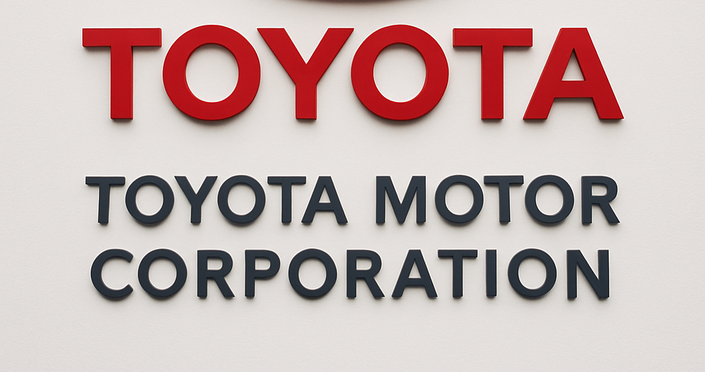Toyota Motor Corporation

Management at Toyota Motor Corporation
Toyota Motor Corporation is one of the global automobile manufacturers company. It is ranked in the top three globally. The organization has a distinctive business model which allows them to do well in the business and to be competent amongst their competitors. The company’s business model utilizes the differentiated strategy which is an incorporated low cost. Writers who offer strategic management assignment help at Edudorm essay writing service notes that this type of strategy involves finding of the lowest cost of operations inclusive of an exclusive niche that separates Toyota Motor Corporation from competition. This business model reflects the company’s future strategies and expectations including the unknown and the known challenges that the company may encounter. With this kind of model, the company has moved into being more of customer centric and thus all their efforts are geared towards satisfying customers’ needs.
Brand Management at Toyota Motor Corporation
Brand management is one of the marketing strategies that Toyota Motor Corporation is using in maintaining its brands in Indonesia, Thailand, and Philippines as well as in Malaysia. This has assisted the company to be customer centric. The company also arranges for partnerships with local wellbeing of increasing loyalty to the business. The company attains their inputs from all the countries to which they manage their brands and hence they are able to interdepend on one another and hence are able to ship the inputs at different tariff rates from the different countries. Experts who offer MBA assignment help at Edudorm essay writing service indicates that media affiliation management is another form of market strategy that the company implies so as to advertise and promote their products to the consumers thus they are able to lessen the gap between Toyota Motor Corporation and the customers. Thus potential customers can be able to connect to the company through the use of media such as through their website and blogs. The company also implies the use of just in time method while manufacturing their products with an aim of producing products that the consumers want in its strong markets.
This is essential as the customers’ information is integrated in the manufacturing process and this helps in reduction of wastages. Authors who offer operations management assignment help at Edudorm essay writing service points that expansion market strategy has enhanced Toyota Motor Corporation to focus on moving towards the new cultures where thy have been able to improve on their interest so as to meet the demands that requires success. Quality management in the company enhances the employees’ participation thus empowering them to produce quality goods (Monden 2013). Distinguishing through the market information strategy has enhanced the employees to continue being innovative while they use the information system so as to help in the setting of prices for the products (Dess et al 2014).
Monitoring of Strategies in Toyota Motor Corporation
Monitoring of the strategies in Toyota Motor Corporation involves the determining of the elements to measure in the company where the company identifies the people who will be in charge of designing, implementing and reporting. This has enabled the company to engage the stakeholders in the process thus enhancing them to understand their perspectives and feedback is integrated hence enabling close evaluation of Toyota Motor Corporation strategic plan (Monden 2013). Tutors who offer corporate strategy assignment help at Edudorm essay writing service acknowledges that establishment of standards is another monitoring element for example, Toyota company Sets of targets to monitor and control the strategic plan. Monitoring is also carried out by measuring of the actual performance for instance; Auditing is used in the company on a regular basis so as to ensure that Toyota Motors is attaining its objectives. Use of reference point in the company is another control activity that ensures that the company is able to gauge its operations basing on the future goals.
Evaluation Process at Toyota Motor Corporation
The best evaluation process used in Toyota Motor Corporation entails the measurement of performance basing on products technology, communication, employees commitment, time and finances. This enables the company to realize some of its strengths that add up to the company’s fundamental competencies that enhance Toyota Motor Corporation to face their competitors even in the future. The company therefore advocates for committed leadership that would help the company to attain its strategic plan (Sinofsky et al 2010).
Ethical Goal of Toyota Motor Corporation
The ethical goal of Toyota Motor Corporation is to be true and fair in their presentations and to comply with the country’s law and morals. Also they aim at maintaining high level of honesty, uprightness, expertise and ethical conduct. Mentors who offer marketing assignment help at Edudorm essay writing service recognizes that the core responsibility of the company is to foresee the future needs and to proactively take steps that are of benefit to the consumers as well as the society. Toyota Motor Corporation’s cooperate social responsibility is to ensure that there is proper management of waste.
The Triple Bottom Line
The Triple Bottom Line is used by Toyota Motor Corporation as it ensures that the main value of sustainability have become convincing in the business world because of the greater long-term productivity. Instructors who offer strategic marketing assignment help at Edudorm essay writing service argues that the adoption of the TBL system in Toyota has enhanced the understanding of the certain standards that are developed by both the internal and external forces and this has enabled the company to expand their information beyond the financial data thus enabling them to understand their impacts of the company on the society and the environmental measures that ought to be taken to enhance sustainability and safety of the society.
References
Dess, G. G., Lumpkin, G. T., Eisner, A. B., & McNamara, G. (2014). Strategic Management.
Monden, Y. (2013). Management of service businesses in Japan. Singapore: World Scientific.
Sinofsky, S., & Iansiti, M. (2010). One strategy: Organization, planning, and decision making. Hoboken, N.J: Wiley.


